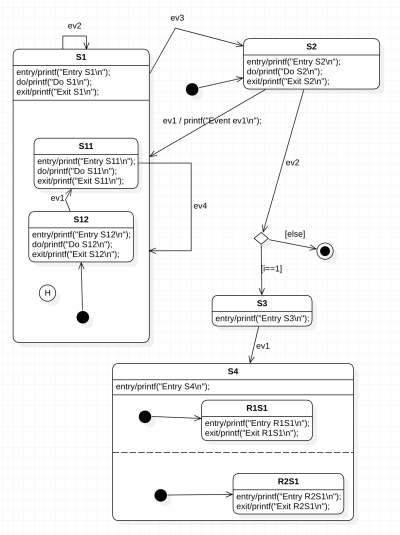Table of Contents
Generate production quality code from state diagrams created with StarUML
The StarUML parser is work in progress. If you are interested in this feature send us a mail expressing your interest and specific needs.
SinelaboreRT generates readable and maintainable code from hierarchical UML state machines. With its unique features and the C code generator the tool covers well the requirements of embedded real-time and low power application developers. With its C++, Python and Java backend it is also a perfect tool for developers of server or desktop applications.
Key Features:
- Automated robustness checks before code generation
- No run-time environment needed
- Can be used with any CPU and with or without OS/RTOS
- Code generation especially for embedded real-time and high availability systems.
- Fits well in different system designs (foreground/background, RTOS-based …)
- No gap between design and code
- Support for automatic test-case generation
- Simulation in interactive or batch mode.
- Optionally generating trace code
- Generated code creates no trouble when using static code checkers
Drawing the State Machine Diagram
StarUML allows efficient drawing of state diagrams as part of a class. The following example state diagram shows the features that are supported from the code generator right now.
Creating Code
It is assumed you have a recent Java version installed e.g. on a Mac.
java --version openjdk 17-ea 2021-09-14 OpenJDK Runtime Environment (build 17-ea+29-2576) OpenJDK 64-Bit Server VM (build 17-ea+29-2576, mixed mode, sharing)
To generate code first export your model to XMI using “File → Export → XMI”.
Then specify StarUML as modelling tool (-p struml) as well as the path to the state diagram inside the model file (-t “Model:class1” ). The command line to generate C-code looks like as follows:
java -cp "/path to codegen jar file/*" codegen.Main -l cx -p StarUML -o testcase -t "Model:class1" testcase.xmi
This generates C-code from the specified state machine diagram.
Supported State Machine Elements
The code-generator supports a relevant subset of the design elements provided by Magic Draw. The supported elements are:
- Hierarchical states
- (Signal-)Events with event name, guard and action
- Initial and final pseudo-states
- History states (deep, flat)
- Choices
Download the demo version and try it right now. It includes many other examples.
StarUML Draw HowTo


AdditionalMachineImplementationInclude=#include <stdint.h>\n#include "testcase_ext.h"\n#include "testcase.h"\n#include <stdio.h>\nextern TESTCASE_EVENT_T msg;\n\n
